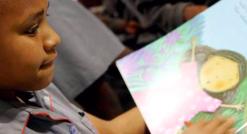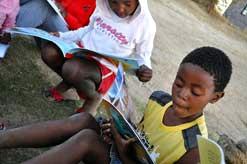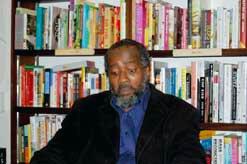
Reading to boost our self esteem
It all started with a tweet on 1 May 2012 notifying people using the social network site of a campaign that was geared not at book lovers, but those who needed to get into the habit. The first objective of ReadaBookSA was to secure 4 000 Twitter followers by the beginning of June 2012, when it […]


It all started with a tweet on 1 May 2012 notifying people using the social network site of a campaign that was geared not at book lovers, but those who needed to get into the habit.
The first objective of ReadaBookSA was to secure 4 000 Twitter followers by the beginning of June 2012, when it would be marking its one-month anniversary. The target was reached, and passed, as early as mid-May, and by 1 June it had comfortably passed the 5 000 mark.
Tebogo Ditshego is the founder of the movement, and his dream is to bring reading into the everyday lives of South Africans. This means quite a culture shift in a country with a literacy rate of 89%, which is lower than its fellow developing countries.
When you follow ReadaBookSA, you essentially pledge to read at least one book a month, an undertaking that Ditshego says is very possible.
“One book a month sounds like a lot, but it turns you into a constant reader, and once you’ve gotten into the habit of doing it that often it will feel only natural to pick up a new book as soon as you’ve finished the last.”

He adds that he foresees a point in the life of the campaign where participants will be able to “read and tweet” books, so that the network is able to stay updated on what interesting new books are out there.
Ditshego feels that there are no limits to how far the project can go.
“It may have started on Twitter, but there’s no telling how it will expand,” he says.
He is not keen, however, to let the cat out of the bag on possible partnerships the project might go into. Not as yet, anyway.
“There are a few proposals, but nothing concrete yet. We are still a young campaign and naturally, we’re open to ideas.”
One idea he has is that in future, when the project is firmly set on its path and is enjoying great impact, it might move towards taking part in exchanging, if not donating, books on behalf of members and perhaps even publishing companies.

Ditshego also envisions a future where South Africans will embrace reading much more than is the case today.
“A society with a strong culture of reading can significantly lift its self-esteem,” he declares.
The UN Development Report of 2011 ranks South Africa at 58 in terms of literacy, out of 123 countries. The good news is that the level has improved from around 82% in 1995, to 89% today.
Efforts from the government and civil society groups have also increased over the years, which might have helped the situation to improve.
Government support
In 2007, then arts and culture minister Pallo Jordan – who was a strong advocate for a move towards publishing South African literature in the country’s indigenous languages – was instrumental in the formation of the South African Book Development Council (SABDC), an organisation whose mission is to promote reading across all ages in the country.
Some of the biggest achievements of the council as listed on their website include the creation of the Book Industry Development Plan as well as the Indigenous Language Publishing Programme, which was started to encourage local authors to write in languages besides English and Afrikaans in order to broaden the base of the country’s readers.
The SABDC’s survey on reading and reading behaviour (2007) found that reading was the fourth most popular leisure activity after socialising with family, watching TV and listening to music.
The research further states that two thirds of the South African population read for leisure, with the majority reading newspapers, which explains why the most likely reason that people read was because it gave them access to knowledge.
The SABDC also administrates National Book Week, an annual initiative that occurs in September and highlights, among other issues, the need for reading to take centre stage in the daily lives of young children. This they hope to achieve by making sure that the book sector is part of national policies and priorities.
What the future holds
Ditshego says he never pitched ReadaBookSA to media outlets in an effort to market it. Whatever feedback the campaign has received for its efforts is testimony to the power of not only social media networks in this day and age, but also good old word-of-mouth marketing.
“Now that we have achieved the objectives of our first phase, which was to build a strong following on Twitter, we can go on to the next phase with confidence,” he says.
The hard work is far from over, he concedes, saying phase two will involve ReadaBookSA expanding on its awareness drive.
“Where the road takes us from there, we’ll just have to wait and see”
And since the encouragement from the founder is for everyone to read one book a month, Mediaclub asked Ditshego how he fares in this challenge.
“I’m on my third book for this month (May),” he says.
Some of the tweets from those encouraged the ReadaBookSA effort:
@Chantefabulous
What a reading session I just had … Feel empowered on so many levels rite now —» The power of reading ☺ —» @ReadaBookSA
@Cleo04patra
Guys, let’s promote enriching minds and the wonders of books and reading! Follow —–>@ReadaBookSA
@JabuBravo
“A room without books is like a body without a soul.” @ReadaBookSA
@MSlulubell
Officially starting a #ToReadList thanks 2 @ReadaBookSA… *sigh* so much 2 read. So lil tym
@PrePre02
Today I’m getting another book to read. The only way to sharpen one’s understanding is through reading Cc @ReadaBookSA
@queenkasmanga
I’m following @ReadaBookSA to empower myself!
By: Valencia Talane
Source: http://www.mediaclubsouthafrica.com
